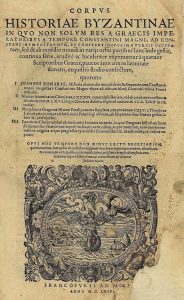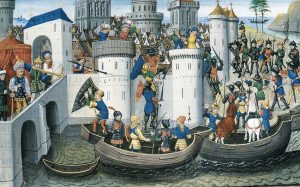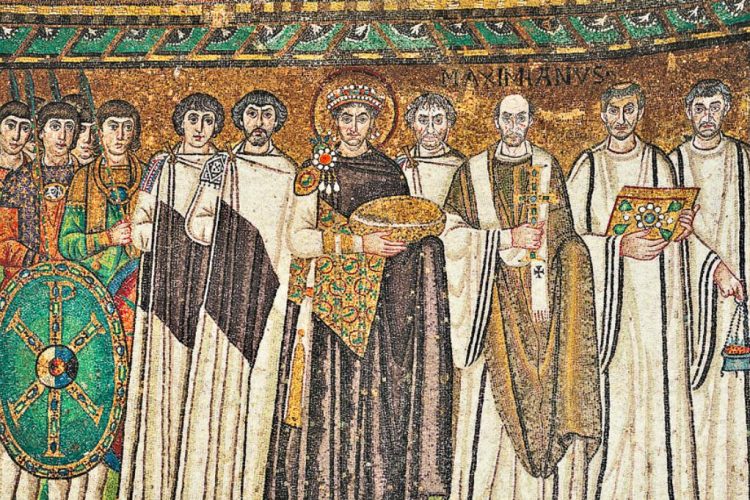Nearly every book on the Byzantine Empire begins by noting that its people never called themselves Byzantine. They were Romans, and always called themselves such; theirs was the true and continuous legacy of the Roman Empire. Readers may nod along and take this in stride; but by the time they finish reading a millennium-worth of history about a Greek-speaking, eastern Mediterranean, Orthodox empire, this point tends to be lost. Byzantium just seems too far removed from the stoic virtue of the Roman Republic or the imperial glory of the Principate. “Byzantine” seems much more fitting a word, a vaguely exotic and romantic name reminiscent of porphyry columns, golden mosaics, and complicated intrigues.

So why is the Byzantine Empire called Byzantine, then? Fairly simple. Its capital was Constantinople, founded by Emperor Constantine I in 330 as the “New Rome”. Constantine built his capital atop a settlement that had already existed for a thousand years, the Greek city of Byzantium. The city became so magnificent—adorned by its rulers with splendid palaces, churches, and statues and columns looted from far-flung lands—that it became a synecdoche for the empire itself.
Over a millennium later, when the 16th-century humanist Hieronymus Wolf published a collection of Latin translations of Byzantine historical texts, he titled it Corpus Historiae Byzantinae—The Corpus of Byzantine History. Wolf was under the spell of Classical Antiquity, and used the older, pre-Christian name for Constantinople to refer to the entire empire. Other scholars followed suit in their Latin translations, and the term “Byzantine” soon entered common parlance.
That is the briefest and most commonly-told story as to how the Byzantine Empire got its name. There is more to why Wolf used the name “Byzantium” in the first place, though. The full story goes back to the Byzantines themselves, and tells us something quite interesting about them.
Back to their Roots
For all the Byzantines trumpeted their Romanitas, they also took pride in their distinctive Greekness. It was an especial point of pride that they had thoroughly Hellenized the surviving part of Rome. “Captive Greece took captive her savage conqueror and brought the arts to rustic Latium,” was how Horace put it in the century before Christ; his words were even more true centuries later.
The Byzantines, therefore, saw it quite natural to turn to their cultural and literary roots. Herodotus and Thucydides were particularly revered by those writing history. It is hard to exaggerate their influence on Byzantine literary style: authors liberally borrowed words, turns of phrase, and entire passages from their works. Any courtier with literary aspirations had to ape his style in order to be taken seriously (Procopius’ account of Justinian’s plague was so close to Thucydides’ description of the Plague of Athens, that its severity was downplayed by many modern historians. Archaeological and DNA evidence have since corroborated his account).
This imitation of the Classics extended even to proper names. Ethnic and geographic names from Thucydides and Herodotus were anachronistically applied to contemporaries: Huns and Alans were called Scythians, Turks were referred to as Persians—and Constantinople was called Byzantium. Later European scholars, who loved to classicize modern names, were imitating the Byzantines themselves in this particular usage. Constantinople was called Byzantium by historians in all ages, from Procopius in the 6th century to John Cantacuzenus in the 14th. These writers often avoided the name of Constantinople entirely, only using its earlier form. Occasionally, the empire itself was even referred to as “Byzantine territory”: here we see Byzantines writers almost, but not quite, use that word in its modern sense.

The 16th- and 17th-century humanists who compiled and edited Greek texts were therefore following in both Byzantine and Renaissance tradition by classicizing the Constantinople’s empire into just “Byzantium”. Yet there was also a third tradition those humanists were following: that of their medieval forebears. Back when Byzantium was a living civilization, Western Europeans never called it “Rome”—they called it Greece, or more generously, Romania. The most common name, however, was the Empire of Constantinople. The Byzantine Empire was so strongly defined by the city that ruled it—the most magnificent in the world—that no other name seemed necessary. So when those classicizing scholars searched for something that could concisely describe their subject, Constantinople’s ancient name was the obvious choice.
Why The Name “Byzantium” Stuck
Revisionist historians are always active, and sometimes successful—persuasive arguments do change the way history is written. Several have demonstrated the deep-running continuity between the empire of Augustus and that of Alexius Comnenus (Anthony Kaldellis is one—his Byzantine Republic is fantastic). Yet no one has managed to change the naming convention set by Hieronymus Wolf 500 years ago.
That is because the convention is so useful. Byzantine civilization is often described as a blend of Roman political institutions, Greek culture, and Orthodox Christian religion. However strongly the Roman legacy was borne by the first, the other two made Byzantium something quite distinct.
Greek became the official language of the Eastern Roman Empire in the early 7th century; a few years later, the Arabs conquered Egypt and Syria, stripping away most of the empire’s non-Greek-speakers. What was left was an empire overwhelmingly dominated by one ethnos. To be Roman, in Byzantine eyes, was to be Greek and Christian. This sense was so strong, that it could be argued Byzantium was not truly an empire—at least not the multi-ethnic imperium of Marcus Aurelius, or even Justinian. While there were certainly many non-Greeks within its boundaries, they were far from the majority. Imperial propaganda claimed Byzantium to be a universal empire, even as it functioned more as a Greek monarchy.
Byzantines’ pride in their Hellenic identity was inflamed by contact with the West. Since Roman times, the Mediterranean had been divided roughly between a Latin-speaking West and a Greek-speaking East. This persisted through the Middle Ages, both in the vernaculars of each and in the liturgies of their respective churches. There had always been some tension between the two spheres, which only accelerated in the 11th century: the Normans pushed the Byzantines out of Italy, there was a schism between the Church of Rome and of Constantinople, the Crusades brought Western armies to Byzantium’s doorstep, and the Italian maritime states began expanding into eastern markets. Although the Byzantines never stopped calling themselves Romans, contact with these bumptious Latins only made them assert their Greekness more.

This was all the more so after 1204, when the Fourth Crusade sacked Constantinople and established a Western-run empire that lasted for 57 years. The Byzantine court was forced into exile in Asia Minor, during which time they turned even more to their Hellenistic ancestors. Under the Palaeologus emperors, who recovered Constantinople and ruled Byzantium for its last two hundred years, scholars turned more to the study of ancient forebears than ever before.
As the Turks conquered more of Byzantium in the 14th and 15th centuries, many of these scholars fled to Italy, bringing with them ancient Greek texts that had been lost to the West for centuries. For the first time in nearly a millennium, knowledge of both the Latin and Greek classics—the literature of the undivided Roman Empire—was known in western lands. Yet the men bringing it seemed so utterly alien to their Italian hosts; likewise for the Byzantines, their exile must have seemed not a reunion of Romanitas, but a sojourn in a strange land. After so long apart, these descendants of Rome had become strangers to each other. A full century after the fall of Constantinople, when Hieronymus Wolf called these people Byzantines, he finally found a name that captured this difference.
